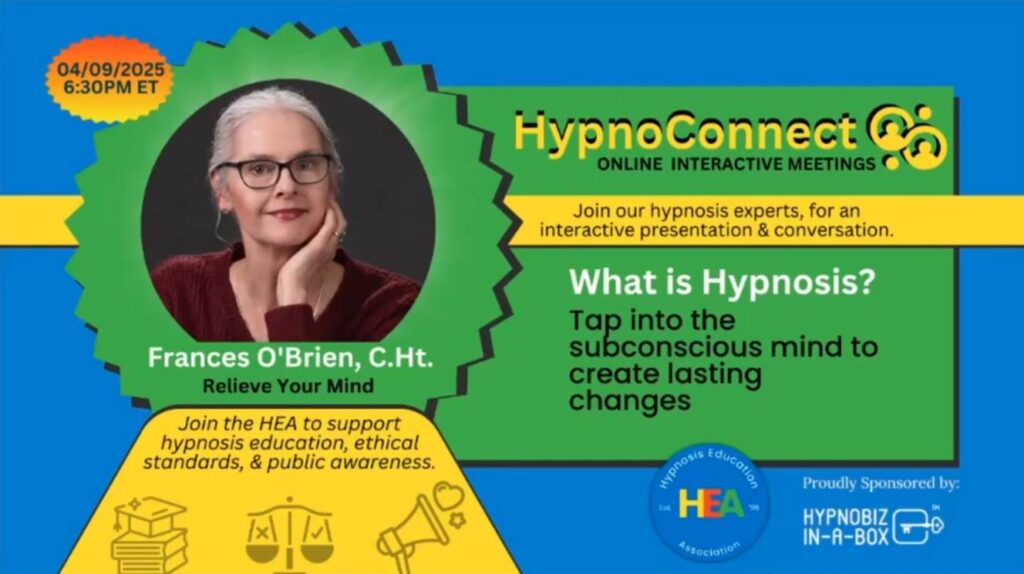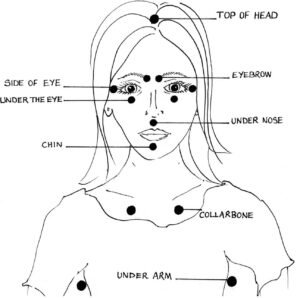
Are you looking for a non-invasive and drug free way to relieve stress? Sensate uses sound and vibration designed to...
Table of Contents
ToggleHypnosis has long been the subject of intrigue, mystery, and misconception. Is it mind control? A trance? A type of magic?
In a powerful presentation for the Hypnosis Education Association (HEA), Frances O’Brien, Certified Hypnotherapist in Los Angeles and founder of Relieve Your Mind, set the record straight. Drawing on years of experience and compassion-centered practice, Frances explained hypnosis not as a loss of control—but as a powerful tool for transformation, healing, and hope.
“Hypnosis is a natural state. You’ve likely already experienced it today.”
Frances described hypnosis as a natural, altered state of consciousness that everyone moves through multiple times a day. Scientifically, it’s known as the alpha brainwave state, the mental state between being fully awake (beta) and deeply asleep (delta).
You’re in hypnosis when you:
Drive home on “autopilot” and don’t recall the trip
Lose track of time watching a movie or reading a book
Daydream about someone you like
Drift off just before sleep or while waking up
In each case, your subconscious mind becomes more active, and your suggestibility increases. This means the brain is more receptive to ideas, messages, and emotional associations—making it a powerful time for healing, goal-setting, and behavior change.
Frances tackled common fallacies and misconceptions head-on:
| Fallacy | Reality |
|---|---|
| Hypnosis is mind control | Hypnosis requires consent. You cannot be hypnotized against your will. |
| You’re unconscious during hypnosis | You’re actually more mentally alert and hyper-focused than usual. |
| Only some people can be hypnotized | Hypnosis is a universal human experience — almost everyone enters the alpha state, often multiple times per day. |
| It’s just for entertainment | Clinical hypnosis is a proven therapeutic technique used for trauma recovery, stress, anxiety, phobias, and more. |

Hypnosis helps clients access their subconscious beliefs and reprogram them for growth. It’s often used to address:
Chronic pain
Fears and phobias
Smoking cessation
Weight loss
Confidence building
Trauma recovery
Frances emphasized that the subconscious mind is where lasting change happens—and hypnosis helps bypass the critical mind to make that change easier and more profound.
“These are the best times to rewire your mind for positivity—when you’re falling asleep or just waking up. Avoid negativity. That’s when affirmations and gratitude practices are most effective.”
One of the most impactful parts of Frances’ presentation was her explanation of emergency hypnosis, also called verbal first aid—the use of calm, intentional language to help someone in a state of shock.
Trauma puts the mind into a hypnotic state automatically. Whether it’s a car crash, wildfire, or medical diagnosis, the primitive mind (fight-or-flight center) takes over and the brain enters alpha. This makes a person more suggestible—and more vulnerable.
“When someone is in trauma, you become their hypnotherapist. Use your words to calm, empower, and guide them back to safety.” – Frances O’Brien
Phrases that help:
This approach can even work when the person is unconscious—the subconscious mind is still listening.
Hypnosis isn’t just a technique—it’s a doorway to hope. Frances discussed how people often define themselves by their trauma, and how therapeutic hypnosis can help reframe that narrative.
“Hope can feel impossible after a devastating loss. Hypnosis helps create a partnership—with yourself—to begin believing that healing is possible.”
She recommends patience and empathy when supporting someone dealing with trauma and suggests using hypnosis to help re-establish a sense of safety, control, and direction.
Here’s how hypnosis is helping real people every day:
And these are just the beginning.
Hypnosis is a naturally occurring state of focused attention and heightened suggestibility, often used therapeutically to create positive behavioral change.
Hypnotherapy works by accessing the subconscious mind during the hypnotic state to address and modify limiting beliefs, habits, or patterns, allowing for positive suggestions and therapeutic interventions to take effect.
Yes, most people can be hypnotized to some degree, especially if they are open, willing, and feel safe with the practitioner.
Yes. Hypnosis is widely used to help people process and heal from trauma, PTSD, and emotional wounds by addressing the subconscious mind directly.
Hypnosis is a legitimate therapeutic technique backed by neuroscience and used in clinical settings worldwide for stress, trauma, habit change, and more.
Yes. Self-hypnosis is a powerful tool for daily mindset work, habit change, and relaxation, and is often taught by certified hypnotherapists.
Hypnosis isn’t a trick. It’s not magic. It’s not mind control.
It’s your mind’s natural ability to enter a more receptive state—and transform from the inside out.
As Frances O’Brien C.Ht. so powerfully demonstrated in her HEA appearance, hypnosis is about empowerment. It’s about reclaiming your peace, reframing trauma, and restoring your belief in what’s possible.
Ready to experience hypnosis yourself?
👉 Book a session with Frances and discover the power of your subconscious mind.
The Relieve Your Mind’s Team
Do you like this post? Share the
Recent Posts

Are you looking for a non-invasive and drug free way to relieve stress? Sensate uses sound and vibration designed to...

When you use EFT on yourself, you raise your energy, and that can only have a positive effect on anyone...

Have you ever noticed that when you’re feeling the most stressed, often you want to eat more? Worse, you crave...

You've read about meditation, diet and nutrition, and perhaps you'd like to have a way to enhance that. Using meditation...

On September 18, 2024, l'll be speaking at an online conference addressing the Emotional and Psychological Impact of Cancer Treatment.

Using this technique cultivates your spirituality, and increases your intuition. It's great to use when you're in recovery from grief,...

Acupressure is an all-natural, easily-performed technique that can be very beneficial in easing pain, releasing stress, improving sleep, increasing immunity,...

According to Judith Acosta and Judith Simon Prager, co-authors of the book The Worst is Over, immediately following a serious...

Emotional Freedom Technique (EFT) is a process of tapping on meridian endpoints. It works on the principal that the cause...
For More Information about using Emotional Freedom Technique Read
Special Offer
Get Your Consultation For Free Today
Your consultation is free of charge. Let's improve your life together.
Services
Group Sessions
Handwriting Analysis
Office
Currently only seeing clients online via Zoom or via phone
Mon - Thurs: 9 a.m. - 5 p.m.
Fri: 9 a.m. - 4 p.m.
Sat - Sun: hours arrangeable
24-hour notice required to schedule, cancel or change an appointment (Sunday not included)
Contact
© 2025 Relieve Your Mind | All Rights Reserved | Powered by X Times More